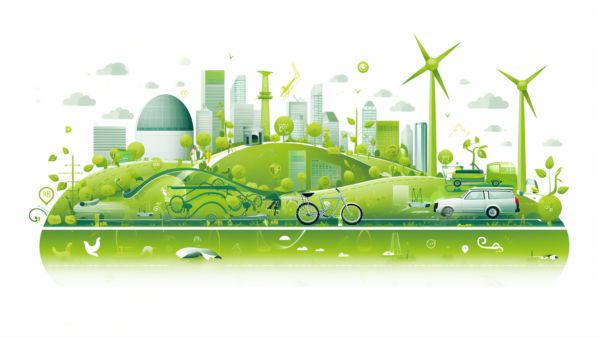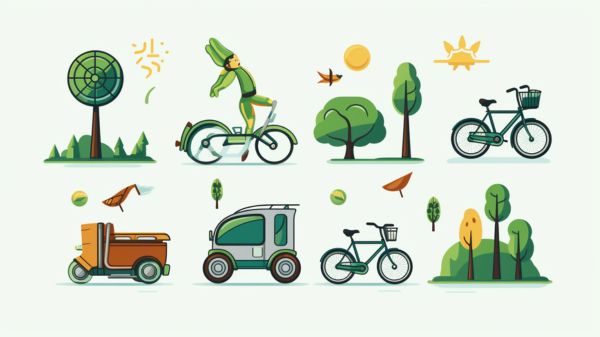Zero Waste Lifestyle: Ultimate Solution for A More Sustainable Life
Ready to discover the incredible benefits of living a zero waste lifestyle? We’ve got you covered!
By embracing this sustainable approach, we can dramatically reduce our environmental footprint, conserve precious resources, and even save some money along the way.
But that’s not all! We’ll also enjoy improved health and well-being, support local communities, and encourage innovation.
Get ready to embark on a journey towards a healthier, greener future. Let’s dive in together!
Reduced Environmental Impact
Reducing waste has a profound effect on our environment by decreasing the amount of materials that end up in landfills and the pollution caused by their production and disposal. Adopting a zero waste lifestyle not only reduces our carbon footprint but also contributes to the reduction of our ecological footprint.
By minimizing waste generation and maximizing resource efficiency, we can significantly decrease our impact on the environment. When we reduce waste, we prevent the release of greenhouse gases that contribute to climate change, such as methane from decomposing organic waste in landfills.
Additionally, by reusing and recycling materials, we conserve natural resources, reduce energy consumption, and limit the pollution associated with resource extraction and manufacturing processes.
Embracing a zero waste lifestyle is an effective way to protect our environment and create a sustainable future.
Conservation of Resources
By adopting a zero waste lifestyle, we can actively contribute to the conservation of valuable resources. Here are four ways in which this lifestyle promotes resource conservation and waste reduction:
- Water conservation: By reducing our consumption and waste generation, we minimize the amount of water used in producing goods and processing waste.
- Energy savings: Zero waste living encourages us to choose products with minimal packaging and to reuse and repair items instead of buying new ones. This decreases energy consumption associated with manufacturing and transportation.
- Preservation of natural resources: When we reduce waste, we reduce the need for extracting and processing raw materials, such as timber, minerals, and fossil fuels.
- Protecting biodiversity: By minimizing waste, we decrease pollution and habitat destruction, helping to preserve ecosystems and the diverse species that depend on them.
Embracing a zero waste lifestyle is a practical and effective way to make a positive impact on our planet by conserving resources and reducing waste.
Cost Savings and Financial Benefits
When it comes to living a zero waste lifestyle, one of the key advantages is the potential for significant cost savings.
By making conscious choices to reduce waste and consume less, individuals and households can save money on a variety of fronts.
From reducing food waste and lowering energy consumption to embracing reusable products and opting for second-hand items, the financial benefits of sustainability are both tangible and substantial.
Economic Advantages of Zero Waste
One of the primary advantages of adopting a zero waste lifestyle is the significant cost savings and financial benefits it offers.
Here are four economic advantages of zero waste:
- Cost savings: By reducing waste and reusing or repurposing items, individuals can save money on purchasing new products. This can lead to lower expenses on household goods, groceries, and other necessities.
- Job creation: Transitioning to a zero waste lifestyle promotes the growth of sustainable industries, such as recycling and composting. These industries require a skilled workforce, leading to job creation and economic growth in local communities.
- Social impact: Zero waste initiatives often involve community engagement and collaboration. By participating in waste reduction efforts, individuals can build stronger community ties and contribute to positive social change.
- Reduced environmental costs: Waste disposal and management are expensive processes. By minimizing waste, individuals can help reduce the financial burden on local governments and taxpayers, allowing funds to be allocated towards other important social and environmental initiatives.
Financial Benefits of Sustainability
We experience significant cost savings and financial benefits through the financial advantages of sustainability, particularly in terms of cost savings and financial benefits.
Sustainable spending and eco-friendly budgeting can have a positive impact on our wallets and the environment. By adopting a zero waste lifestyle, we can reduce our consumption and waste, which in turn reduces our expenses. For example, buying in bulk and using reusable containers can save money on packaging and reduce waste.
Additionally, opting for energy-efficient appliances and practices can lower utility bills. Moreover, choosing sustainable transportation options like biking or carpooling can save on fuel costs. All these small changes can add up to substantial savings over time.
Improved Health and Well-being
When we adopt a zero waste lifestyle, we can experience improved health and well-being in several ways. Firstly, by creating a cleaner living environment, we reduce our exposure to harmful toxins and pollutants that can negatively impact our health.
Additionally, by reducing pollution levels and embracing sustainable resource consumption, we contribute to a healthier planet, which in turn supports our own well-being.
Cleaner Living Environment
Our zero waste lifestyle has led to a cleaner living environment, resulting in improved health and well-being for us. Here are four benefits we’ve experienced:
- Cleaner air: By reducing waste, we contribute to cleaner air quality. This is because waste reduction minimizes the need for incineration and landfilling, which release harmful pollutants into the atmosphere. Breathing cleaner air improves our respiratory health and reduces the risk of respiratory illnesses.
- Reduced chemical exposure: Adopting a zero waste lifestyle means using natural and non-toxic alternatives to common household products. This reduces our exposure to harmful chemicals found in conventional cleaning supplies, personal care products, and plastics. By avoiding these toxins, we protect our health and reduce the risk of developing chronic diseases.
- Improved indoor environment: Minimizing waste means decluttering our living spaces and maintaining cleanliness. This leads to a healthier indoor environment, free from dust, allergens, and potential breeding grounds for pests. A clean and organized home promotes mental well-being and reduces stress.
- Enhanced connection with nature: Embracing a zero waste lifestyle encourages us to spend more time outdoors, connecting with nature. Engaging in activities like composting, gardening, and recycling fosters a deeper appreciation for the environment. This connection with nature improves our overall well-being, reducing stress and promoting a sense of belonging to the natural world.
Reduced Pollution Levels
One significant benefit of adopting a zero waste lifestyle is the reduction in pollution levels, which directly contributes to improved health and well-being. By implementing effective waste management strategies, such as recycling, composting, and reducing single-use items, we can significantly decrease air pollution.
When waste ends up in landfills, it decomposes and releases harmful gases, including methane, a potent greenhouse gas that contributes to climate change. By diverting waste from landfills, we can reduce the emission of these gases and improve air quality. This, in turn, leads to a decrease in respiratory issues, allergies, and other health problems associated with air pollution.
Additionally, by reducing pollution levels, we create a cleaner and healthier living environment for ourselves and future generations.
Sustainable Resource Consumption
To continue our exploration of the advantages of a zero waste lifestyle, let’s delve into the realm of sustainable resource consumption, which greatly improves our health and well-being. Adopting resource management practices and reducing waste can have several positive effects on our overall health.
Here are four ways sustainable resource consumption enhances our well-being:
- Reduced exposure to harmful chemicals: By minimizing waste and opting for natural, non-toxic products, we limit our exposure to harmful chemicals that can negatively impact our health.
- Cleaner air and water: Waste reduction helps decrease pollution levels, leading to cleaner air and water. Breathing clean air and consuming clean water is vital for maintaining good health.
- Enhanced nutrition: By choosing fresh, organic foods and reducing food waste, we can improve our nutrition and overall well-being.
- Stress reduction: Practicing resource management and waste reduction can help alleviate stress. Knowing that we’re making a positive impact on the environment and our health can promote a sense of well-being and satisfaction.
Supporting Local Communities
We can actively support local communities by embracing a zero waste lifestyle. By supporting local businesses, we contribute to the economic growth and sustainability of our communities. When we choose to buy from local stores and markets, we help create jobs and keep the money circulating within our community. This, in turn, leads to increased community engagement as local businesses often sponsor events, donate to local causes, and actively participate in community development.
Additionally, embracing a zero waste lifestyle encourages us to reduce our consumption and make more conscious choices about our purchases. This can lead to a decrease in waste production and a decrease in the demand for products that harm the environment.
Promoting Sustainable Consumption
Promoting sustainable consumption involves actively choosing products and services that align with our zero waste lifestyle. By engaging in sustainable shopping practices and supporting ethical production, we can make a positive impact on the environment and society.
Here are four ways we can promote sustainable consumption:
- Prioritize second-hand items: Opting for pre-loved products not only reduces waste but also supports a circular economy, where resources are reused and repurposed.
- Choose eco-friendly materials: Look for products made from sustainable materials such as organic cotton, bamboo, or recycled materials. These choices help reduce resource extraction and minimize pollution.
- Support local and small businesses: By shopping locally, we reduce the carbon footprint associated with long-distance transportation and support our community’s economy.
- Consider the full lifecycle of a product: Before making a purchase, evaluate how the item was produced, how long it will last, and how it can be responsibly disposed of. This approach ensures we make more conscious and sustainable choices.
Minimizing Pollution and Landfill Waste
Minimizing pollution and landfill waste is an essential aspect of adopting a zero waste lifestyle. By reducing waste generation and minimizing landfill pollution, we can make a significant impact on the environment.
Landfills are a major source of pollution, releasing harmful greenhouse gases, leachate, and toxins into the air, soil, and water. By adopting zero waste practices such as recycling, composting, and reusing, we can divert waste from landfills and reduce the associated pollution.
Additionally, by choosing products with minimal packaging and opting for reusable alternatives, we can further minimize waste generation. Taking these steps not only benefits the environment but also promotes a sense of belonging within a community that values sustainability and collective action.
Together, we can make a difference and create a cleaner, healthier planet for future generations.
Encouraging Innovation and Circular Economy
One advantage of adopting a zero waste lifestyle is the potential for fostering innovation and a circular economy. By encouraging innovation, we can discover new ways to reduce waste and create sustainable products and systems.
Here are four ways in which a zero waste lifestyle can encourage innovation and contribute to a circular economy:
- Designing for durability: By focusing on creating products that are built to last, we can reduce the need for constant consumption and disposal. This encourages innovation in product design and materials, promoting a shift towards more sustainable and long-lasting options.
- Implementing waste-to-resource systems: A zero waste lifestyle encourages the development of systems that convert waste into valuable resources. This includes recycling, composting, and upcycling, which require innovation in waste management technologies and processes.
- Promoting sharing and collaborative consumption: Embracing a zero waste lifestyle encourages the sharing of resources and collaborative consumption. This leads to innovative business models such as sharing platforms and rental services, reducing the demand for new products and promoting a circular economy.
- Supporting local and sustainable economies: Adopting a zero waste lifestyle often involves purchasing locally produced and sustainable products. This supports local businesses and encourages innovation in sustainable agriculture, manufacturing, and transportation systems.
Conclusion
In conclusion, embracing a zero waste lifestyle not only benefits the environment but also brings numerous advantages to individuals and communities.
Did you know that the average person produces about 4.4 pounds of waste per day? By adopting zero waste practices, we can significantly reduce this amount, leading to a cleaner and healthier planet for future generations.
Additionally, this lifestyle promotes sustainable consumption, supports local economies, and encourages innovative solutions for waste management.
Start small, make a difference, and join the zero waste movement today!







One Comment
Comments are closed.